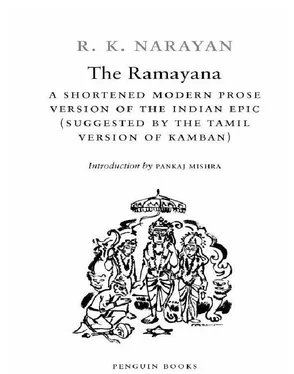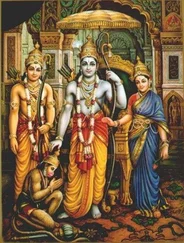Махариши Вальмики - The Ramayana
Здесь есть возможность читать онлайн «Махариши Вальмики - The Ramayana» весь текст электронной книги совершенно бесплатно (целиком полную версию без сокращений). В некоторых случаях можно слушать аудио, скачать через торрент в формате fb2 и присутствует краткое содержание. Жанр: Старинная литература, на английском языке. Описание произведения, (предисловие) а так же отзывы посетителей доступны на портале библиотеки ЛибКат.
- Название:The Ramayana
- Автор:
- Жанр:
- Год:неизвестен
- ISBN:нет данных
- Рейтинг книги:3 / 5. Голосов: 1
-
Избранное:Добавить в избранное
- Отзывы:
-
Ваша оценка:
- 60
- 1
- 2
- 3
- 4
- 5
The Ramayana: краткое содержание, описание и аннотация
Предлагаем к чтению аннотацию, описание, краткое содержание или предисловие (зависит от того, что написал сам автор книги «The Ramayana»). Если вы не нашли необходимую информацию о книге — напишите в комментариях, мы постараемся отыскать её.
The Ramayana — читать онлайн бесплатно полную книгу (весь текст) целиком
Ниже представлен текст книги, разбитый по страницам. Система сохранения места последней прочитанной страницы, позволяет с удобством читать онлайн бесплатно книгу «The Ramayana», без необходимости каждый раз заново искать на чём Вы остановились. Поставьте закладку, и сможете в любой момент перейти на страницу, на которой закончили чтение.
Интервал:
Закладка:
Rama’s army cleared and made way for Ravana’s chariot, unable to stand the force of his approach. Ravana blew his conch and its shrill challenge reverberated through space. Following it another conch, called “Panchajanya,” which belonged to Mahavishnu (Rama’s original form before his present incarnation), sounded of its own accord in answer to the challenge, agitating the universe with its vibrations. And then Matali picked up another conch, which was Indra’s, and blew it. This was the signal indicating the commencement of the actual battle. Presently Ravana sent a shower of arrows on Rama; and Rama’s followers, unable to bear the sight of his body being studded with arrows, averted their heads. Then the chariot horses of Ravana and Rama glared at each other in hostility, and the flags topping the chariots—Ravana’s ensign of the Veena and Rama’s with the whole universe on it—clashed, and one heard the stringing and twanging of bow-strings on both sides, overpowering in volume all other sound. Then followed a shower of arrows from Rama’s own bow. Ravana stood gazing at the chariot sent by lndra and swore, “These gods, instead of supporting me, have gone to the support of this petty human being. I will teach them a lesson. He is not fit to be killed with my arrows but I shall seize him and his chariot together and fling them into high heaven and dash them to destruction.” Despite his oath, he still strung his bow and sent a shower of arrows at Rama, raining in thousands, but they were all invariably shattered and neutralized by the arrows from Rama’s bow, which met arrow for arrow. Ultimately Ravana, instead of using one bow, used ten with his twenty arms, multiplying his attack tenfold; but Rama stood unhurt.
Ravana suddenly realized that he should change his tactics and ordered his charioteer to fly the chariot up in the skies. From there he attacked and destroyed a great many of the monkey army supporting Rama. Rama ordered Matali, “Go up in the air. Our young soldiers are being attacked from the sky. Follow Ravana, and don’t slacken.”
There followed an aerial pursuit at dizzying speed across the dome of the sky and rim of the earth. Ravana’s arrows came down like rain; he was bent upon destroying everything in the world. But Rama’s arrows diverted, broke, or neutralized Ravana’s. Terror-stricken, the gods watched this pursuit. Presently Ravana’s arrows struck Rama’s horses and pierced the heart of Matali himself. The charioteer fell. Rama paused for a while in grief, undecided as to his next step. Then he recovered and resumed his offensive. At that moment the divine eagle Garuda was seen perched on Rama’s flagpost, and the gods who were watching felt that this could be an auspicious sign.
After circling the globe several times, the duelling chariots returned, and the fight continued over Lanka. It was impossible to be very clear about the location of the battleground as the fight occurred here, there, and everywhere. Rama’s arrows pierced Ravana’s armour and made him wince. Ravana was so insensible to pain and impervious to attack that for him to wince was a good sign, and the gods hoped that this was a turn for the better. But at this moment, Ravana suddenly changed his tactics. Instead of merely shooting his arrows, which were powerful in themselves, he also invoked several supernatural forces to create strange effects: He was an adept in the use of various asthras which could be made dynamic with special incantations. At this point, the fight became one of attack with supernatural powers, and parrying of such an attack with other supernatural powers.
Ravana realized that the mere aiming of shafts with ten or twenty of his arms would be of no avail because the mortal whom he had so contemptuously thought of destroying with a slight effort was proving formidable, and his arrows were beginning to pierce and cause pain. Among the asthras sent by Ravana was one called “Danda,” a special gift from Shiva, capable of pursuing and pulverizing its target. When it came flaming along, the gods were struck with fear. But Rama’s arrow neutralized it.
Now Ravana said to himself, “These are all petty weapons. I should really get down to proper business.” And he invoked the one called “Maya”—a weapon which created illusions and confused the enemy.
With proper incantations and worship, he sent off this weapon and it created an illusion of reviving all the armies and its leaders—Kumbakarna and Indrajit and the others—and bringing them back to the battlefield. Presently Rama found all those who, he thought, were no more, coming on with battle cries and surrounding him. Every man in the enemy’s army was again up in arms. They seemed to fall on Rama with victorious cries. This was very confusing and Rama asked Matali, whom he had by now revived, “What is happening now? How are all these coming back? They were dead.” Matali explained, “In your original identity you are the creator of illusions in this universe. Please know that Ravana has created phantoms to confuse you. If you make up your mind, you can dispel them immediately.” Matali’s explanation was a great help. Rama at once invoked a weapon called “Gnana”—which means “wisdom” or “perception.” This was a very rare weapon, and he sent it forth. And all the terrifying armies who seemed to have come on in such a great mass suddenly evaporated into thin air.
Ravana then shot an asthra called “Thama,” whose nature was to create total darkness in all the worlds. The arrows came with heads exposing frightening eyes and fangs, and fiery tongues. End to end the earth was enveloped in total darkness and the whole of creation was paralysed. This asthra also created a deluge of rain on one side, a rain of stones on the other, a hail-storm showering down intermittently, and a tornado sweeping the earth. Ravana was sure that this would arrest Rama’s enterprise. But Rama was able to meet it with what was named “Shivasthra.” He understood the nature of the phenomenon and the cause of it and chose the appropriate asthra for counteracting it.
Ravana now shot off what he considered his deadliest weapon—a trident endowed with extraordinary destructive power, once gifted to Ravana by the gods. When it started on its journey there was real panic all round. It came on flaming toward Rama, its speed or course unaffected by the arrows he flung at it.
When Rama noticed his arrows falling down ineffectively while the trident sailed towards him, for a moment he lost heart. When it came quite near, he uttered a certain mantra from the depth of his being and while he was breathing out that incantation, an esoteric syllable in perfect timing, the trident collapsed. Ravana, who had been so certain of vanquishing Rama with his trident, was astonished to see it fall down within an inch of him, and for a minute wondered if his adversary might not after all be a divine being although he looked like a mortal. Ravana thought to himself, “This is, perhaps, the highest God. Who could he be? Not Shiva, for Shiva is my supporter; he could not be Brahma, who is four faced; could not be Vishnu, because of my immunity from the weapons of the whole trinity. Perhaps this man is the primordial being, the cause behind the whole universe. But whoever he may be, I will not stop my fight until I defeat and crush him or at least take him prisoner.”
With this resolve, Ravana next sent a weapon which issued forth monstrous serpents vomiting fire and venom, with enormous fangs and red eyes. They came darting in from all directions.
Rama now selected an asthra called “Garuda” (which meant “eagle”). Very soon thousands of eagles were aloft, and they picked off the serpents with their claws and beaks and destroyed them. Seeing this also fail, Ravana’s anger was roused to a mad pitch and he blindly emptied a quiverful of arrows in Rama’s direction. Rama’s arrows met them half way and turned them round so that they went back and their sharp points embedded themselves in Ravana’s own chest.
Читать дальшеИнтервал:
Закладка:
Похожие книги на «The Ramayana»
Представляем Вашему вниманию похожие книги на «The Ramayana» списком для выбора. Мы отобрали схожую по названию и смыслу литературу в надежде предоставить читателям больше вариантов отыскать новые, интересные, ещё непрочитанные произведения.
Обсуждение, отзывы о книге «The Ramayana» и просто собственные мнения читателей. Оставьте ваши комментарии, напишите, что Вы думаете о произведении, его смысле или главных героях. Укажите что конкретно понравилось, а что нет, и почему Вы так считаете.












